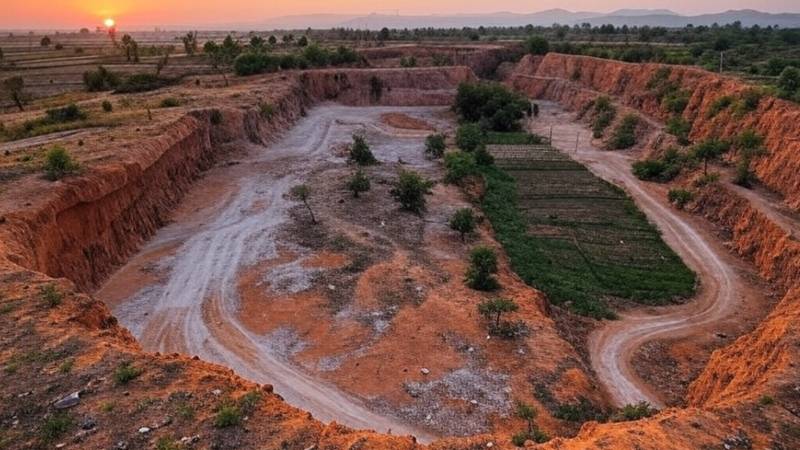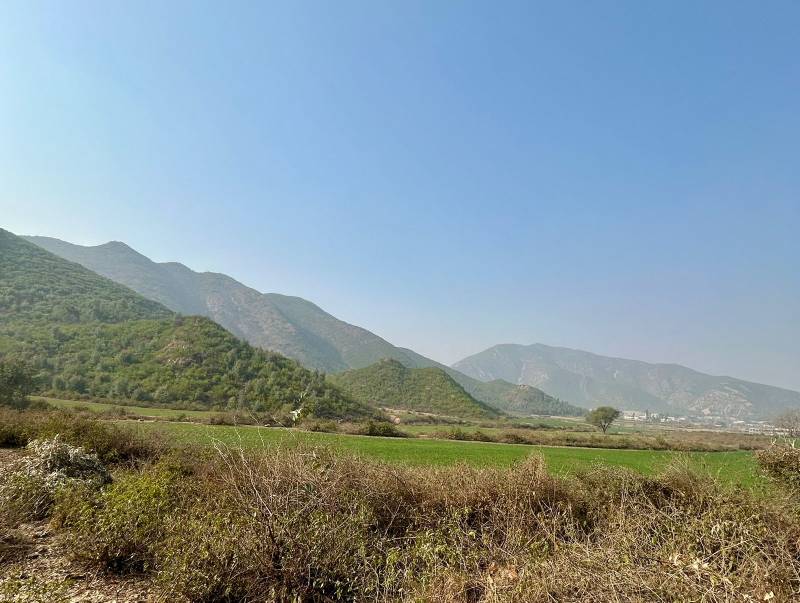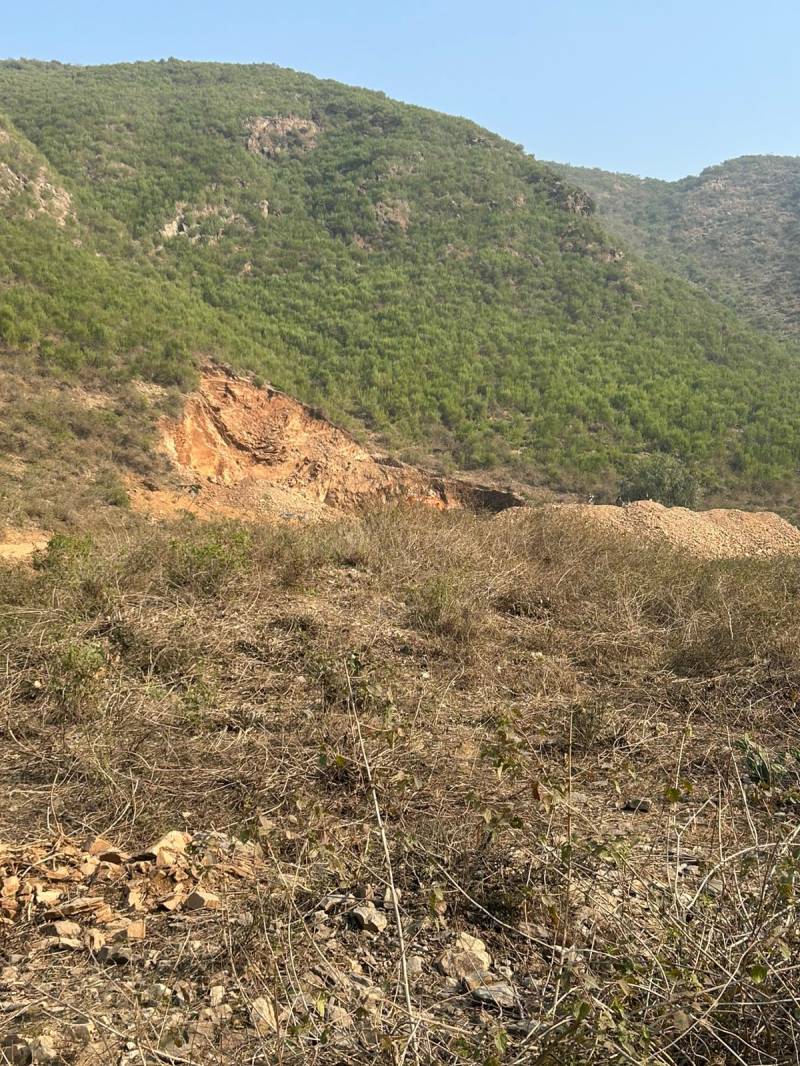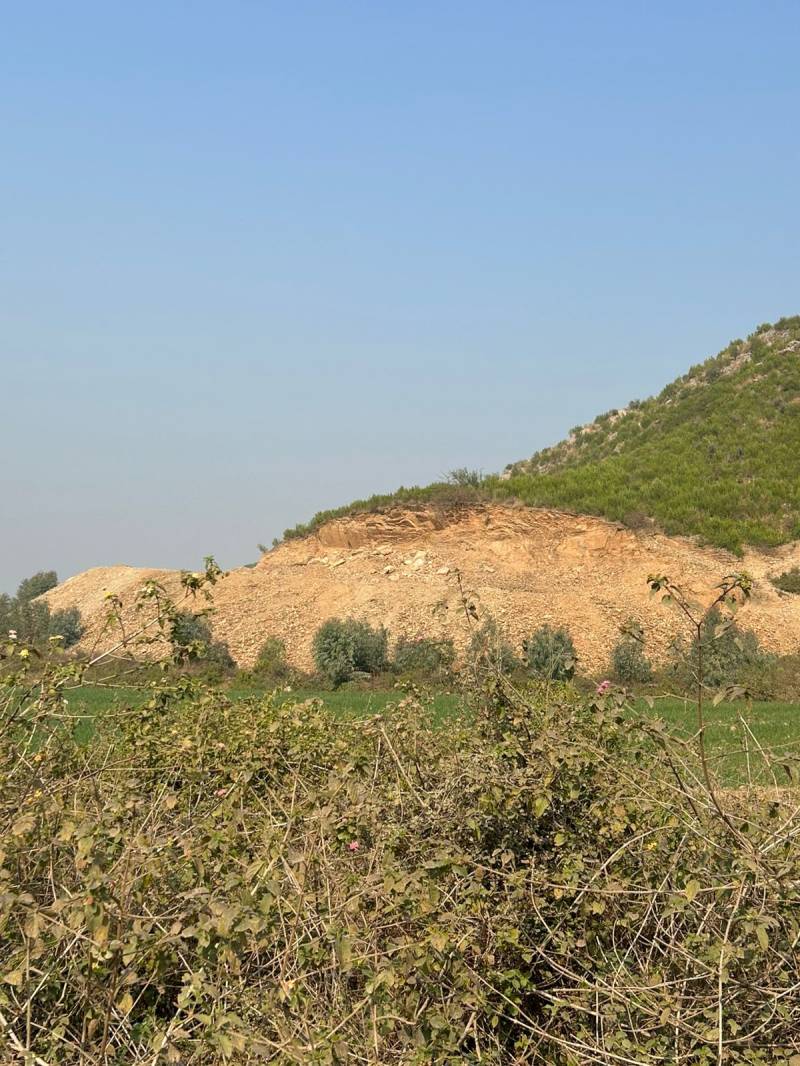
“Suddenly the tractors and excavators appeared from nowhere. No sooner did we realise what was going on, they started to bulldoze a vast area adjacent to the tranquil hills, raising plumes of dust and soil into the air and the adjacent areas, making breathing difficult,” says Sher Baz, a local farmer and a small landholder from Jhanda village, District Swabi in Khyber-Pakhtunkhwa (KP). “Ever since, the community has been deprived of peace and tranquillity – that was our prized possession and has been snatched by the mining mafia that is digging up beautiful sites for mineral exploration in the region with no regard to the wishes of the aggrieved local communities,” he adds.

This pattern of development has been frequently reported from all provinces of Pakistan, or for that matter, this is a recurring pattern in all underdeveloped nations under the sway of global trends where profits and economic interests precede concerns for the safety and wellbeing of the public and their communities. The upsurge in exploration of mineral and other resources has spiked in the last decade despite the global climate change risk that accompanies such activities without adequate safeguards. Striking a balance between the two is an exercise to evaluate cost benefits, of depleting resources, as well as sustainability of the planet, as many participants witnessed during the enlightening two-day plenaries during the Breathe Pakistan climate change conference held in Islamabad recently. “Climate resilience should be at the centre of all future development & planning” was a refrain echoed by the distinguished speakers and experts. How far have these tall claims been translated into action? This is what remains to be seen and is the fundamental question around the climate action debate worldwide.
Village Jhanda is synonymous with its serene, unpolluted, and clean environment - cherished qualities that are getting increasingly rare as Pakistan races towards unsustainable development in both rural and urban landscapes, turning them into veritable concrete wastelands. Like the urban centres, the once pristine rural regions are rapidly deteriorating into uninhabitable slums. These have resulted in the increase in preventable diseases & deaths, especially various types of cancers which were rare a few decades ago. Meanwhile, the affected population gasps for clean air, thirsts for clean water, and a soil free of pesticides, herbicides, and other pollutants.

Commercial quarrying, mining, and crushing of limestone, gravel, and mineral extraction in environmentally fragile areas are a source of irreversible damage to the ecosystem as well as the natural habitat, resulting in adverse impacts on entire communities. The affected population suffers the consequences, as social responsibility towards environmental concerns is lacking in both the government and private sector. Although public interest and wellbeing should be the foremost priority of the government, “vested lobbies” with political clout make policy decisions. Consequently, communities are the ultimate losers in mostly profit-driven projects, lacking safeguards. Public consultation with community members, the mandatory first step for obtaining an NOC, is mostly overlooked before the machines start degrading the environment of the entire community, which is the case in the controversial project.
The KP government needs to reconsider the proposed lease, which falls short of meeting the Environmental Quality Standards
Consequently, the introduction of crushing machinery in Village Jhanda, in District Swabi, with excavation and blasting, will irreversibly damage this delicate ecosystem. Such activities will not only increase PM 2.5 and PM 10 particulate levels in the atmosphere but also generate damaging noise pollution. “The combination of these pollutants will severely degrade air quality, posing critical health risks to the local population, particularly vulnerable groups such as children, the elderly, and those with preexisting respiratory conditions. Beyond human health, the ecological damage to the flora and fauna of the region will be catastrophic, disrupting the balance of nature that sustains the area's biodiversity,” according to Bushra Gohar, a former MNA and a rights activist from Jhanda village, who is leading a campaign to halt the activity.
Direct threat to villagers’ health and constitutional rights
“Air quality in the region already surpasses permissible limits established by the National Environmental Quality Standards (NEQS) of Pakistan. Pakistan is amongst the top three nations with worse air quality globally. The addition of industrial activities will worsen air pollution, releasing harmful particulate matter into the atmosphere and contributing to the thickening of smog and haze that is claiming many lives according to WHO reports,” according to Dawar Hameed Butt, an expert on air quality who heads Climate Action Pakistan Group (CAPk) and is working on a policy level to control smog with the Punjab and the federal government. These pollutants are known to cause chronic respiratory diseases, cardiovascular complications, and other long-term health issues like cancer.

“This situation constitutes a direct violation of Article 9 and 14 of the Constitution of Pakistan, which enshrine the right to an environmentally safe life, health, and dignity. The Supreme Court has repeatedly affirmed that a clean and sustainable environment is essential for human dignity. To permit such hazardous activities near expanding residential areas is to endanger not only human lives but also the dignity and fundamental rights of every individual in this region,” adds Dawar Hameed Butt.
Exacerbation of environmental crises
“Pakistan already ranks as one of the most polluted nations; in fact, like India, it hogs the top ranking in air quality on the Air Quality Index, globally. A fact that reflects poorly on our collective commitment to environmental stewardship. The installation of crushing machinery and blasting operations will further accelerate environmental degradation, contributing to soil erosion, deforestation, and the destruction of natural landscapes. Dust and debris from these activities will settle on crops and water sources, contaminating them and rendering them unfit for use.
Local agriculture, which depends on the clean air, soil, and water of the region, will face severe setbacks, threatening livelihoods and food security,” says Dr. Khalid Khan, a Climate Change expert from Sustainable Conservation Network, an advocacy group. Under the PEPA and KP EPA, Act 2014, any public or private project needs mandatory approval (NOC) for Initial Environmental Assessment & Environmental Impact Assessment Rule (2021). Both of these government approvals have been missing in the planning phase and hence in violation of EPA-KP 2014.
Destruction of community and cultural heritage
“Village Jhanda is not merely a geographic location; it is a symbol of peace, community well-being, and famous for its natural beauty. The proposed industrial activities threaten to displace local residents, disrupt their way of life, and destroy the cultural heritage that has been preserved for generations. The noise, dust, and environmental chaos from these operations will render the area unliveable, forcing families to abandon their ancestral homes and leaving behind a ghostly scar of what was once a thriving community,” explains Bushra Gohar, a petitioner for the case against the ongoing quarrying.
Prof Shakeel Ahmad, former professor of English and VC, Islamia College University, informed, “Farmers find rare relics of Gandharan, as well as Hindu Shahi period treasures, such as coins, sculpture, pottery, and ornaments while tilling the lands; besides illegal excavations for business, as the area remains neglected by the archaeological experts and the government.”
“This news is shocking, to say the least. Jhanda and Boko are very important from an archaeological point of view, and almost as important as Ranighat, Swabi nearby. Some relics adorn the drawing-rooms of local notable families, while many have minted money here through the sale of Gandharan pieces (reportedly some had to be carried in cots owing to the size),” he added.
“Disturbing these quiet backwaters, and ignoring the salvage of our Gandharan heritage, can only be lamented for the apathy shown by the relevant authorities. The entire region has a historical significance dating back to Greco-Buddhist eras. Hence, it should be listed as a heritage site by the Directorate of Archaeology of KP. This island of spirituality can be an ideal destination for both eco and cultural tourism,” says the former professor, who is a heritage expert whose grandparents belonged to Boko village adjacent to Jhanda, Swabi,” rues Prof Shakeel.
In light of these devastating and far-reaching consequences, the concerned authorities would be well advised to prioritise environmental sustainability and public health over short-term industrial gains. Allowing such destructive activities in Village Jhanda would set a dangerous precedent for further unregulated mining activities, undermining not only the local ecosystem but also our national commitment to a clean, greener, and healthier future.
“Being a signatory to Paris conventions and protocols on Climate Change, Pakistan is bound to conserve its biodiversity and environment and refrain from projects for short-term interests at the expense of irreversible damage to the ecosystem. Pakistan has been ranked 8th amongst the top vulnerable nations on the Global Climate Change Risk Index,” informs Dawar Hameed Butt.
The KP government needs to reconsider the proposed lease, which falls short of meeting the Environmental Quality Standards (NEQS), and call for a collective commitment to preserving the natural beauty, health, and dignity of this region and the wellbeing of the population.
“Ours is a small but beautiful village which is being ruthlessly destroyed by unplanned planning. Yet the mining activity will totally decimate this area,” laments Bushra Gohar, the former parliamentarian, now an environmental crusader fighting for a worthy cause in her hometown Jhanda, Swabi.

